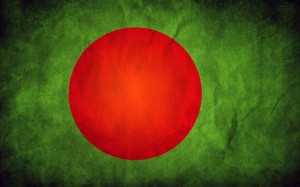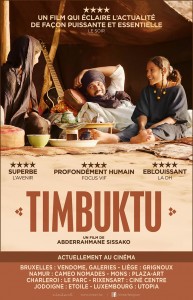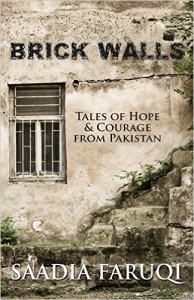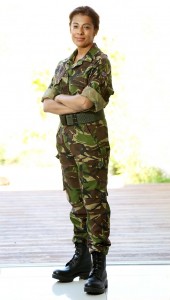The earthquake that shook Pakistan and Kashmir in 2005 killed thousands and left millions homeless. Pakistani-American Nausheen Dadabhoy felt it was her responsibility to give a voice to those affected by the earthquake. Through visits to hospitals and camps, Dadabhoy met Ruqiya and Khalida, two women whose lives had changed due to the disaster.
In “The Ground Beneath Their Feet: A Tale of Pakistani Women,” Dadabhoy presents the story of these two women, who courageously had to redefine their lives after being injured in the earthquake. Having to renounce to the traditional roles prescribed in some sectors of Pakistani society because of their disabilities, Ruqiya and Khalida have to reconsider their lives as disabled women in a society that values women as able-bodied homemakers and mothers.
We interviewed Dadabhoy about her project, which is almost complete. You can support the project here and here.
MMW: Could you tell us more about your inspiration to tell the story of Ruqiya and Khalida?
ND: As a Pakistani-American I was deeply affected by the tragedy, and as a filmmaker I felt the need to go to Pakistan and tell the story of those affected by the disaster.
Two weeks after the earthquake, I arrived in Kashmir and toured the affected area. I visited many Internally Displaced People (IDP) camps and makeshift hospitals. When I got to the Melody Relief and Rehabilitation Center (MRRC) in Islamabad, the situation of the patients struck me as tragic and in need of more attention. The MRRC is a clinic for women who suffered spinal cord injuries during the earthquake and are now paraplegic.
I knew that the women at the MRRC had now lost value in society. They would not only struggle with their new disability, but also need to redefine their roles as women. Though I was born and raised in the United States, as a Pakistani woman I know the difficulties that these women face. By deciding to become a filmmaker, I chose a non-traditional career path, and in doing so I faced many challenges from my culture. The women at the MRRC are forced into a position of challenging their culture, not by choice, but by circumstance.
MMW: In your Facebook page you explain that both women were the opposite of each other, what do you think contributed to Ruqiya being able to deal with the situation better than Khalida?
ND: Ruqiya’s sister Bushra was at the hospital caring for her. Her fiancé still wanted to marry her, and she knew that she would have a place in her brother’s home even if she didn’t marry. She had a great sense of security about her future. Ruqiya comes from the capital of Kashmir, Muzaffarabad, so she knew that she could get the care she needed at home.
Khalida’s family, on the other hand, comes from a very mountainous region, and she knew that she would be unable to go home and live in her village again. They don’t have the facilities in her village to care for her, and she would just be trapped between the four walls of her home. Khalida had no future to look forward to, and she was very depressed. She lost the use of her legs while trying to help her blind father escape from their home, but they both got trapped beneath the rubble, and her father died. This obviously contributed heavily to her initial outlook.
MMW: What role do the family and society play in the identity-restructuring process that both women have gone through?
ND: Their families play huge role in their lives. This is a very communal society. These women do not make decisions for themselves, but their elders and male relatives make decisions for them, since they are considered more educated. Khalida’s family broke many of these conventions, and allowed her to make her own decision about what would be best for her. She has three older brothers, and even though one opposed her, the rest of the family told her to do whatever made her happy, and not to worry about how society would judge her, because they supported her. In the end Khalida does not return to her village, but moves to the big city of Muzaffarabad where she has a job and has become independent. Khalida’s family did not want her to feel limited by her disability, so they gave her more freedom than she would have had before the injury.
Ruqiya’s family created the opposite situation for her. Though her fiancé still wanted to marry her, they refused to let her get married, because they didn’t feel that anyone would care for her as well as they care for her. Ruqiya had a job similar to Khalida, working at a facility teaching self-sufficiency to newly disabled individuals. Ruqiya’s father asked her to quit, because he didn’t think it was appropriate for his daughter to be working outside the home, and her mother worried about her when she was out of the house. Ruqiya now spends all of her time at home watching television, and feeling ashamed of her disability.
MMW: Does the film reflect specific views on women and Islam particular to their own context? How?
ND: I have not made any statements about Islam, but this film does show the role of women in a Muslim society. But I think it’s a more cultural/socio-economic discussion than religious. In terms of rural Pakistani communities, women are seen as homemakers and caretakers. They go from their father’s home to their husband’s home. Both the girls left school as a young age to help out in the home, and were waiting to get married when the earthquake struck. After they were paralyzed, they didn’t know what kind of future they would have, because they had suddenly lost their worth in society. If they couldn’t cook, clean and take care of the home, then no man would want them as a wife.
In Kashmir there is no industry, so it’s very hard for men to find work. Many Kashmiris serve in the Pakistan military, or move to Karachi or Islamabad for work. Though I found that Kashmiri society valued women’s education more than I expected, it’s not like the American culture that I grew up in where you’re encouraged to get educated to have a career. Furthermore, there aren’t many jobs for women or men. Some women do work as schoolteachers or health workers, but even if a woman works outside the home she must still come home and make sure that the house is clean and dinner is on the table.
The film is meant to help audiences understand this different social structure, so that women in Islamic societies aren’t seen as oppressed. Their goals and values are very different from ours in the U.S. The sign of a successful woman there is someone who is married and has children.
MMW: How do you hope to impact Muslims with this film?
ND: It is important to me that Americans identify with Pakistanis and Muslims as people and not just as the “other.” News stories in the United States about Pakistan are often related to political unrest or terrorism. In our current social climate in the United States, Islamaphobia seems to be on the rise. I feel it is more important than ever for Americans to experience the life of an ordinary family in Pakistan, so that terrorism does not become Pakistan’s and the Muslim world’s preeminent identifying characteristic.
The Ground Beneath Their Feet shows a truthful and detailed view of a Pakistani family life while trying to deal with a very atypical situation. The pain and suffering that Ruqiya and Khalida face in order to take back their lives is very human and universal. The film reveals the similarities in family dynamics, values, and the everyday struggles that all people face. I hope that audience can draw parallels between their own families and the ones depicted in the film.












